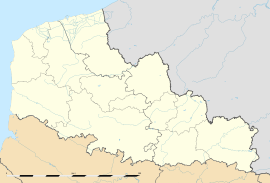Beuvry
| Beuvry | |
|---|---|
 Beuvry | |
|
Location within Nord-Pas-de-Calais region  Beuvry | |
| Coordinates: 50°31′14″N 2°40′49″E / 50.5206°N 2.6803°ECoordinates: 50°31′14″N 2°40′49″E / 50.5206°N 2.6803°E | |
| Country | France |
| Region | Nord-Pas-de-Calais |
| Department | Pas-de-Calais |
| Arrondissement | Béthune |
| Canton | Nœux-les-Mines |
| Intercommunality | Artois |
| Government | |
| • Mayor (2008–2014) | Nadine Lefebvre |
| Area | |
| • Land1 | 16.85 km2 (6.51 sq mi) |
| Population (2009) | |
| • Population2 | 8,856 |
| • Population2 Density | 530/km2 (1,400/sq mi) |
| INSEE/Postal code | 62126 / 62660 |
|
1 French Land Register data, which excludes lakes, ponds, glaciers > 1 km² (0.386 sq mi or 247 acres) and river estuaries. 2 Population without double counting: residents of multiple communes (e.g., students and military personnel) only counted once. | |
Beuvry is a commune in the Pas-de-Calais department in the Nord-Pas-de-Calais region in northern France.
Geography
A suburban town immediately southwest of Béthune, 23 miles (37.0 km) southwest of Lille, at the junction of the D945, D72 and N41 roads. Light industry and a little farming have replaced the coal mining of the past.
History
The town's name comes from beaver (in Old French, bièvre) and underwent variations on this over the centuries: Berri; Beuvri; Bevery; Bouvry and finally Beuvry.

On September 19, 1784 the Robert brothers (Anne-Jean Robert and Marie-Noël Robert) plus M. Collin-Hullin flew their hydrogen balloon, La Caroline, for 6 hours 40 minutes, covering 186 km from Paris to Beuvry. La Caroline owed its design to the work of professor Jacques Charles and Jean Baptiste Meusnier and achieved the world's first ever flight over 100 km.[ 1][ 1] In the Ville de Beuvry a stone monument was erected to commemorate the 200th anniversary landing of the brothers in La Caroline on September 19, 1784.[ 1] A celebration ball la ducasse "du Ballon" is now held at the end of every September.[ 1] The town has been awarded the Croix de guerre twice: after World War I and again, after World War II.
A coal-mining town for about 100 years, the last pit closed in the 1960s.
The town was merged with the nearby city of Béthune at the end of 1993. However, many of the Beuvrygeois voiced their dissatisfaction with the decision at the time, which resulted in the municipal elections of 1995, petitions in 1995 and 1996 and the creation, in October 1996, of a special commission to give an opinion on draft amendments to the territorial limits of the city of Béthune for the re-creation of a separate town of Beuvry. The municipal election in September 1997 led to a de-merger and Beuvry became an independent full-fledged town again in November 1997.
Population
| Historical population | ||
|---|---|---|
| Year | Pop. | ±% |
| 1962 | 7,749 | — |
| 1968 | 7,907 | +2.0% |
| 1975 | 8,147 | +3.0% |
| 1982 | 8,840 | +8.5% |
| 1990 | 8,744 | −1.1% |
| 1999 | 9,175 | +4.9% |
| 2009 | 8,856 | −3.5% |
Sights
- The church of St. Martin, dating from the sixteenth century.
- An old windmill
- The Prévôté building (once belonging to an abbey)..
- The sixteenth-century Manor of l'Estracelles.
- An eighteenth-century chateau.
- The Commonwealth War Graves Commission cemetery.
International relations
Beuvry is twinned with:
 Hemer, Germany.
Hemer, Germany.
See also
References
External links
| Wikimedia Commons has media related to Beuvry. |
- A website about the history of Beuvry (French)
- The CWGC cemetery
- The Gorre CWGC cemetery
- Beuvry on the Quid website (French)